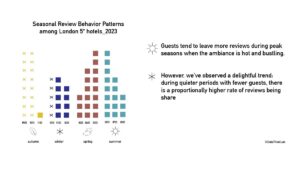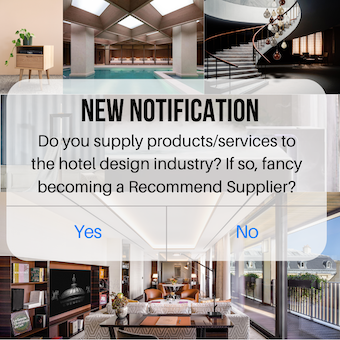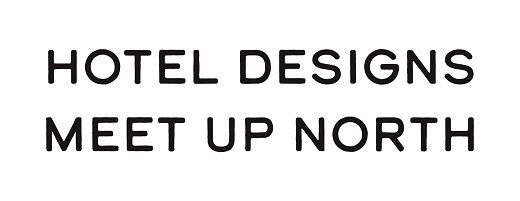In this third and final article Founder of DataThinkLab, Melanie Rozencwajg, continues her mission to help boutique hotels and chains unlock the potential of their data and navigate the technological landscape to enhance innovative decision-making…

Data has long been a cornerstone of business intelligence, with its challenges rooted in locating, cleansing, interpreting and presenting it effectively. The hotel industry, in particular, is privileged to sit upon vast reserves of dormant data. However, this landscape is characterised by fragmentation due to various SaaS platforms, siloed solutions that necessitate consolidation, and untapped opportunities to leverage existing technologies.

Image credit: DataThinkLab
With the advent of AI, NLP and no-code solutions, the democratisation of the data process has undergone significant change: tasks that once took hours, such as scraping and finding data, cleaning datasets and applying code for analysis, can now be conducted much faster. Thanks to new AI co-pilots, you don’t need to be a professional coder, instead, you can use natural language to communicate with the computer and let it code your demands.
AI tools can process data much faster than humans, meaning that the insights gained from your analyses are obtained more quickly. Additionally, thanks to AI fact-checking and validation, inconsistencies in your data can be rapidly detected. In other words, AI enables you to process more complex information and cross-reference data from online to offline touchpoint quickly and efficiently.

Image credit: Zennio
Data is a vital asset in today’s digital world, altering how we live, work and interact. Yet, for a long time, data analysis was accessible only to a select few with the necessary resources and technical expertise to collect, process and analyse it. This situation created a significant disparity between those with access to data and those without, leading to unequal opportunities and resources. The advent and rise of no-code and AI technologies are breaking down these barriers. Data democratisation is empowering boutique establishments without a technical background to gain a deep understanding of their data, and consequently, a more profound understanding of their guests.
By analysing external data (such as online reviews, ratings, comments, and testimonials) alongside internal data from Property Management Systems (PMS) and Customer Relationship Management (CRM) systems, hotels can strategically leverage customer actions and feedbacks in their marketing efforts. As Sona from Ekimetrics emphasises, ‘clients can benefit greatly by focusing on the strong signals from customer touchpoints, both online and offline.’ This approach enables for example hotels to distinguish themselves from the competition and develop tailored services that meet their clients’ needs and fulfil their dreams.
Ultimately, hotels are dream makers, offering guests a retreat from their daily lives—an escape into fantasy. It’s encouraging to know that all players can take action based on data insights, allowing them to make their guests’ dreams even grander.

Image credit: DataThinkLab
Benefit of AI and data democratisation
The democratisation of AI and data, facilitated by AI technologies, enables individuals without technical backgrounds to delve into the realm of data analytics. This inclusivity enriches data interpretation by incorporating diverse perspectives. As highlighted in our first article, designers, for instance, could emerge as influential figures in data-driven environments. Their problem-solving approach, which emphasises human-centric solutions over technological constraints, injects a novel viewpoint into data analysis. Designers have the distinct ability to concentrate on the core issue, leveraging their creativity to analyse data and identify opportunities that might be missed by others. For example, by investigating the motives behind certain anomalies, such as hotel guests booking unusually long stays, new avenues for business innovation could be revealed.
Data is complex
At the heart of it, data captures snapshots of our world, offering insights that enable us to provide personalised experiences. The increasing accessibility of data is indeed a positive development. However, it’s important to remember that data is inherently complex. This complexity is a fundamental aspect of our reality — a world teeming with information that can be combined in countless ways. Unveiling new perspectives or discovering insights often requires more than just a superficial examination; it necessitates a thorough investigation into the context, demanding time and effort. The process of interpreting data is akin to detective work aimed at solving business challenges. It is crucial to dedicate adequate time to formulating the question that initiated the exploration, ensuring that our use of data effectively informs our strategic decisions.

Image credit: Zennio
Pros and Cons of Data Democratisation
While the democratisation of data opens avenues for innovation and enhanced decision-making, it also highlights concerns regarding data governance, privacy, and security. Balancing personalised guest experiences with ethical data use standards is delicate, necessitating a careful approach to data collection and application. However, these challenges are not insurmountable. With appropriate frameworks and ethical guidelines, the hospitality industry can navigate these issues, ensuring both guest privacy and the integrity of personalised services
The Future of Data in Hospitality
While the concept of data democratisation is promising and set to foster a culture of innovation and creativity within the industry, incorporating ethical considerations and ensuring data security will be crucial to fully realising its potential. However, its practical implementation presents challenges. Data often remains isolated within silos and suffers from ambiguous ownership. Moreover, a lack of data literacy within organisations can lead to misinterpretation or poor decisions. Addressing concerns about data quality, integrity and security is essential in making data accessible and meaningful.
Nonetheless, the rise of AI affords data analysts more time to focus on critical aspects: collaborating with business owners and operators to frame the right business cases and refining the art of interpretation. This includes the ability to uncover insights that may be overlooked by others, which are invaluable for hotels seeking to differentiate themselves, understand their market position, and offer unique experiences to their guests.
At DataThinkLab, we are convinced that while no-code and AI technologies will transform the efficiency of data processing, they also offer an opportunity for the creative interpretation of data. Moreover, the way insights are presented—in an era of SaaS and data chart fatigue—has vast potential for innovation. The aesthetic presentation of data for communication purposes, crucial for engaging employees, will become increasingly important in the future.
Main image credit: The Hoxton Vienna
























